哈佛大学公开课《公正》课堂笔记
哈佛大学公开课《公正》课堂笔记.doc
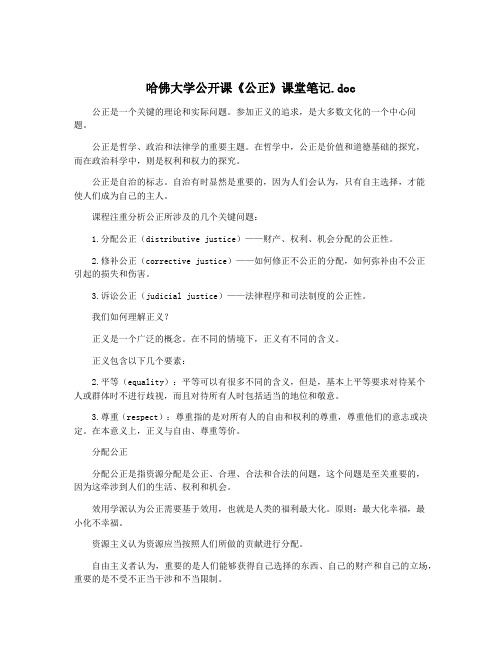
哈佛大学公开课《公正》课堂笔记.doc公正是一个关键的理论和实际问题。
参加正义的追求,是大多数文化的一个中心问题。
公正是哲学、政治和法律学的重要主题。
在哲学中,公正是价值和道德基础的探究,而在政治科学中,则是权利和权力的探究。
公正是自治的标志。
自治有时显然是重要的,因为人们会认为,只有自主选择,才能使人们成为自己的主人。
课程注重分析公正所涉及的几个关键问题:1.分配公正(distributive justice)——财产、权利、机会分配的公正性。
2.修补公正(corrective justice)——如何修正不公正的分配,如何弥补由不公正引起的损失和伤害。
3.诉讼公正(judicial justice)——法律程序和司法制度的公正性。
我们如何理解正义?正义是一个广泛的概念。
在不同的情境下,正义有不同的含义。
正义包含以下几个要素:2.平等(equality):平等可以有很多不同的含义,但是,基本上平等要求对待某个人或群体时不进行歧视,而且对待所有人时包括适当的地位和敬意。
3.尊重(respect):尊重指的是对所有人的自由和权利的尊重,尊重他们的意志或决定。
在本意义上,正义与自由、尊重等价。
分配公正分配公正是指资源分配是公正、合理、合法和合法的问题,这个问题是至关重要的,因为这牵涉到人们的生活、权利和机会。
效用学派认为公正需要基于效用,也就是人类的福利最大化。
原则:最大化幸福,最小化不幸福。
资源主义认为资源应当按照人们所做的贡献进行分配。
自由主义者认为,重要的是人们能够获得自己选择的东西、自己的财产和自己的立场,重要的是不受不正当干涉和不当限制。
马克思主义强调,分配应基于不同的需求,而不是贡献,应该根据各个人的基本需要以均等的方式进行分配。
修补公正人们无法忽略的是,虽然我们都希望进行公正的资源分配,但有时它仍会失败。
此时,我们则需要进行一些修补,来纠正不正当的分配。
此时就涉及到了“修补公正”。
有两种基本的思路:1.撤销(restitution):撤销原来有利的状态,消除不公正的结果。
哈佛大学公开课-公正justice 06-Mind Your Motive The Supreme Principle of Morality 考虑你的动机道德的
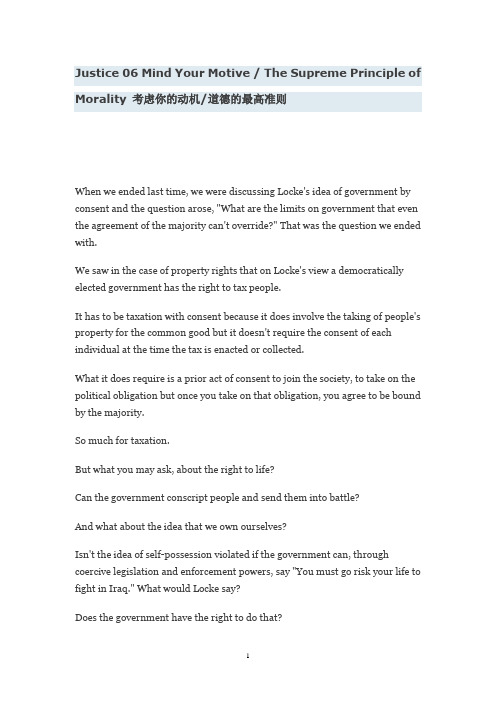
Justice 06 Mind Your Motive / The Supreme Principle of Morality 考虑你的动机/道德的最高准则When we ended last time, we were discussing Locke's idea of government by consent and the question arose, "What are the limits on government that even the agreement of the majority can't override?" That was the question we ended with.We saw in the case of property rights that on Locke's view a democratically elected government has the right to tax people.It has to be taxation with consent because it does involve the taking of people's property for the common good but it doesn't require the consent of each individual at the time the tax is enacted or collected.What it does require is a prior act of consent to join the society, to take on the political obligation but once you take on that obligation, you agree to be bound by the majority.So much for taxation.But what you may ask, about the right to life?Can the government conscript people and send them into battle?And what about the idea that we own ourselves?Isn't the idea of self-possession violated if the government can, through coercive legislation and enforcement powers, say "You must go risk your life to fight in Iraq." What would Locke say?Does the government have the right to do that?Yes. In fact he says in 139, he says, "What matters is that the political authority or the military authority not be arbitrary, that's what matters." And he gives a wonderful example.He says "A sergeant, even a sergeant, let alone a general, a sergeant can command a soldier to go right up to a face of a cannon where he is almost sure to die, that the sergeant can do.The general can condemn the soldier to death for deserting his post or for not obeying even a desperate order.But with all their power over life and death, what these officers can't do is take a penny of that soldier's money because that has nothing to do with the rightful authority, that would be arbitrary and it would be corrupt." So consent winds up being very powerful in Locke, not consent of the individual to the particular tax or military order, but consent to join the government and to be bound by the majority in the first place.That's the consent that matters and it matters so powerfully that even the limited government created by the fact that we have an unalienable right to life, liberty, and property, even that limited government is only limited in the sense that it has to govern by generally applicable laws, the rule of law, it can't be arbitrary.That's Locke.Well this raises a question about consent.Why is consent such a powerful moral instrument in creating political authority and the obligation to obey?Today we begin to investigate the question of consent by looking at a concrete case, the case of military conscription.Now some people say if we have a fundamental right that arises from the idea that we own ourselves, it's a violation of that right for government to conscript citizens to go fight in wars.Others disagree.Others say that's a legitimate power of government, of democratically elected governments, anyhow, and that we have an obligation to obey.Let's take the case of the United States fighting a war in Iraq.News accounts tells us that the military is having great difficulty meeting its recruitment targets.Consider three policies that the U.S. government might undertake to deal with the fact that it's not achieving its recruiting targets.Solution number one: increase the pay and benefits to attract a sufficient number of soldiers.Option number two: shift to a system of military conscription, have a lottery, and whose ever numbers are drawn, go to fight in Iraq.System number three: outsource, hire what traditionally have been called mercenaries, people around the world who are qualified, able to do the work, able to fight well, and who are willing to do it for the existing wage.So let's take a quick poll here.How many favor increasing the pay?A huge majority.How many favor going to conscription?Maybe a dozen people in the room favor conscription.What about the outsourcing solution?Okay, so there may be two, three dozen.During the Civil War, the Union used a combination of conscription and the market system to fill the ranks of the military to fight in the Civil War.It was a system that began with conscription but if you were drafted and didn't want to serve, you could hire a substitute to take your place and many people did.You could pay whatever the market required in order to find a substitute, people ran ads in newspapers, in the classified ads offering 93 for a substitute who would go fight the Civil War in their place.In fact, it's reported that Andrew Carnegie was drafted and hired a substitute to take his place for an amount that was a little less than the amount he spent in the year on fancy cigars.Now I want to get your views about this Civil War system, call it the hybrid system, conscription but with a buyout provision.How many think it was a just system?How many would defend the Civil War system?Anybody?Anybody else?How many think it was unjust?Most of you don't like the Civil War system, you think it's unjust.Let's hear an objection.Why don't you like it?What's wrong with it? Yes.Well by paying $300 to be exempt one time around, you're really putting a price on valuing human life and we established earlier, that's really hard to do so they're trying to accomplish something that really isn't feasible.Good. So paying someone $300 or $500 or $1,000 - You're basically saying that's what their life is worth to you.That's what their life is worth, it's putting a dollar v alue on life.That's good. What's your name?-Liz.Liz.Well, who has an answer for Liz.You defended the Civil War system, what do you say?If you don't like the price then you have the freedom to not be sold or hired so it's completely up to you.I don't think it's necessarily putting a specific price on you and if it's done by himself, I don't think there's anything that's really morally wrong with that.So the person who takes the $500, let's say, he's putting his own price on his life or on the risk of his life and he should have the freedom to choose to do that.Exactly.What's your name?- Jason.Jason. Thank you.Now we need to hear from another critic of the civil war system. Yes.It's a kind or coercion almost, people who have lower incomes, for Carnegie he can totally ignore the draft, $300 is an irrelevant in terms of his income but someone of a lower income, they're essentially being coerced to draft, to be drafted, it's probably they're not able to find a replacement.Tell me your name.Sam.Sam. All right so you say, Sam, that when a poor laborer accepts $300 to fight in the Civil War, he is in effect being coerced by that money given his economic circumstances whereas Carnegie can go off, pay the money, and not serve.Alright. I want to hear someone who has a reply to Sam's argument, that what looks like a free exchange is actually coercive.Who has an answer to Sam?Go ahead.I'd actually agree with him in saying that - You agree with Sam.I agree with him in saying that it is coercion in the sense that it robs individual of his ability to reason.Okay, and what's your name?Raul.All right. So Raul and Sam agree that what looks like a free exchange, free choice, voluntary act actually involves coercion.It's profound coercion of the worst kind because it falls so disproportionately upon one segment of the society.Good. Alright. So Raul and Sam have made a powerful point.Who would like to reply?Who has an answer for Sam and Raul?Go ahead.I don't think that these drafting systems are really terribly different from all volunteer army sort of recruiting strategies.The whole idea of having benefits and pay for joining the army is sort of a coercive strategy to get people to join.It is true that military volunteers come from disproportionately lower economic status and also from certain regions of the country where you can use like patriotism to try and coerce people to feel like it's the right thing to do to volunteer and go over to Iraq.And tell me your name.Emily.Alright, Emily says, and Raul you're going to have to reply to this so get ready.Emily says fair enough, there is a coercive element to the Civil War system when a laborer takes the place of Andrew Carnegie for $500.Emily concedes that but she says if that troubles you about the Civ il War system shouldn't that also trouble you about the volunteer army today?Before you answer, how did you vote in the first poll?Did you defend the volunteer army?I didn't vote.You didn't vote.By the way, you didn't vote but did you sell your vote to the person sitting next to you?No. Alright.So what would you say to that argument.I think that the circumstances are different in that there was conscription in the Civil War.There is no draft today and I think that volunteers for the army today have a more profound sense of patriotism that is of an individual choice than those who were forced into the military in the Civil War.Somehow less coerced?Less coerced.Even though there is still inequality in American Society?Even though, as Emily points out, the makeup of the American military is not reflective of the population as a whole?Let's just do an experiment here.How many here have either served in the military or have a family member who has served in the military in this generation, not parents?Family members. In this generation.And how many have neither served nor have any brothers or sisters who have served?Does that bear out your point Emily?Yes.Alright. Now we need to hear from - most of you defended the idea of the all volunteer military overwhelmingly and yet overwhelmingly, people considered the Civil War system unjust.Sam and Raul articulated reasons for objecting to the Civil War system, it took place against a background of inequality and therefore the choices people made to buy their way in to military service were not truly free but at least partly coerced.Then Emily extends that argument in the form of a challenge.Alright, everyone here who voted in favor of the all volunteer army should be able - should have to explain what's the difference in principle.Doesn't the all volunteer army simply universalize the feature that almost everyone found objectionable in the Civil War buyout provision?Did I state the challenge fairly Emily?Yes.Okay. So we need to hear from a defender of the all volunteer military who can address Emily's challenge.Who can do that?Go ahead.The difference between the Civil War system and the all volunteer army system is that in the Civil War, you're being hired not by the government, but by an individual and as a result, different people who get hired by different individuals get paid different amounts.In the case of the all volunteer army, everyone who gets hired is hired by the government and gets paid the same amount.It's precisely the universalization of essentially paying your way to the army that makes the all volunteer army just.Emily?I guess I'd frame the principle slightly differently.On the all volunteer army, it's possible for somebody to just step aside and not really think about the war at all.It's possible to say, "I don't need the money, I don't need to have an opinion about this, I don't need to feel obligated to take my part and defend my country.With the coercive system, or sorry, with an explicit draft then there's the threat at least that every individual will have to make some sort of decision regarding military conscription and perhaps in that way, it's more equitable.It's true that Andrew Carnegie might not serve in any case but in one, he can completely step aside from it, and the other there's some level of responsibility.While you're there, Emily, so what system do you favor, conscription?I would be hard pressed to say but I think so because it makes the whole country feel a sense of responsibility for the conflict instead of having a war that's maybe ideologically supported by a few but only if there's no real responsibility.Good. Who wants to reply?Go ahead.So I was going to say that the fundamental difference between the all volunteer army and then the army in the Civil War is that in the all volunteer army, if you want to volunteer that comes first and then the pay comes after whereas in the Civil War system, the people who are accepting the pay aren't necessarily doing it because they want to, they're just doing it for the money first.What motivation beyond the pay do you think is operating in the case of the all volunteer army?Like patriotism for the country.Patriotism. Well what about - And a desire to defend the country.There is some motivation in pay but the fact that it's first and foremost an all volunteer army will motivate first I think, personally.Do you think it's better?And tell me your name.Jackie.Jackie do you think it's better if people serve in the military out of a sense of patriotism than just for the money?Yes, definitely because the people who - that was one of the main problems in the Civil War is that the people that you're getting to go in it to go to war aren't necessarily people who want to fight and so they won't be as good soldiers as they will be had they been there because they wanted to be.Alright, what about Jackie's having raised the question of patriotism, that patriotism is a better or a higher motivation than money for military service.Who would like to address that question?Go ahead.Patriotism absolutely is not necessary in order to be a good soldier because mercenaries can do just as good of a job as anyone who waves the American flag around and wants to defend what the government believes that we should do.Did you favor the outsourcing solution?Yes sir.Alright, so let Jackie respond.What's your name?Philip.What about that Jackie?So much for patriotism.If you've got someone whose heart is in it more than another person, they're going to do a better job.When it comes down to the wire and there's like a situation in which someone has to put their life on the line, someone who's doing it because they love this country will be more willing to go into danger than someone who's just getting paid, they don't care, they've got the technical skills but they don't care what happens because they really have - they have nothing like nothing invested in this country.There's another aspect though once we get on to the issue of patriotism.If you believe patriotism, as Jackie does, should be the foremost consideration and not money, does that argue for or against the paid army we have now?We call it the volunteer army though if you think about it, that's a kind of misnomer.A volunteer army as we use the term, is a paid army.So what about the suggestion that patriotism should be the primary motivation for military service not money?Does that argue in favor of the paid military that we have or does it argue for conscription?And just to sharpen that point building on Phil's case for outsourcing, if you think that the all volunteer army, the paid army, is best because it lets the market allocate positions according to people's preferences and willingness to serve for a certain wage, doesn't the logic that takes you from a system of conscription to the hybrid Civil War system to the all volunteer army, doesn't the idea of expanding freedom of choice in the market, doesn't that lead you all the way if you followed that principle consistently to a mercenary army?And then if you say no, Jackie says no, patriotism should count for something, doesn't that argue for going back to conscription if by patriotism, you mean a sense of civic obligation?Let's see if we can step back from the discussion that we've had and see what we've learned about consent as it applies to market exchange.We've really heard two arguments, two arguments against the use of markets and exchange in the allocation of military service.One was the argument raised by Sam and Raul, the argument about coercion, the objection that letting the market allocate military service may be unfair and may not even be free if there's severe inequality in the society so that people who buy their way into military service are doing so not because they really want to but because they have so few economic opportunities that that's their best choice and Sam and Raul say there's an element of coercion in that, that's one argument.Then there is a second objection to using the market to allocate military service, that's the idea that military service shouldn't be treated as just another job for pay because it's bound up with patriotism and civic obligation.This is a different argument from the argument about unfairness and inequality and coercion, it's an argument that suggests that maybe where civic obligations are concerned, we shouldn't allocate duties and rights by the market.Now we've identified two broad objections.What do we need to know to assess those objections?To assess the first, the argument from coercion, inequality, and unfairness, Sam, we need to ask what inequalities in the background conditions of society undermine the freedom of choices people make to buy and sell their labor, question number one.Question number two: to assess the civic obligation patriotism.Argument: we have to ask what are the obligations of citizenship?Is military service one of them or not?What obligates us as citizens?What is the source of political obligation?Is it consent or are there some civic obligations we have, even without consent, for living and sharing in a certain kind of society?We haven't answered either of those questions but our debate today about the Civil War system and the all volunteer army has at least raised them and those are questions we're going to return to in the coming weeks.Today I'd like to turn our attention and get your views about an argument over the role of markets in the realm of human reproduction and procreation.Now with infertility clinics, people advertise for egg donors and from time to time, in the Harvard Crimson ads appear for egg donors.Have you seen them?There was one that ran a few years ago that wasn't looking for just any egg donor, it was an ad that offered a large financial incentive for an egg donor from a woman who was intelligent, athletic, at least 5'10", and with at least 1400 or above on her SATs.How much do you think the person looking for this egg donor was willing to pay for an egg from a woman of that description?What would you guess?A thousand dollars?Fifteen thousand? Ten?I'll show you the ad.Fifty thousand dollars for an egg but only a premium egg.What do you think about that?Well there are also sometimes ads in the Harvard Crimson and the other college newspapers for sperm donors.So the market in reproductive capacities is an equal opportunity market.Well not exactly equal opportunity, they're not offering $50,000 for sperm but there is a company, a large commercial sperm bank that markets sperm, it's called California Cryobank, it's a for-profit company, it imposes exacting standards on the sperm it recruits, and it has offices in Cambridge, between Harvard and MIT, and in Palo Alto near Stanford.Cryobank's marketing materials play up the prestigious source of its sperm.Here is, from the website of Cryobank, the information.Here they talk about the compensation although compensation should not be the only reason for becoming a sperm donor, we are aware of the considerable time and expense involved in being a donor.So do you know what they offer?Donors will be reimbursed $75 per specimen, up to $900 a month if you donate three times a week, and then they add "We periodically offer incentives such as movie tickets or gift certificates for the extra time and effort expended by participating donors." It's not easy to be a sperm donor.They accept fewer than five percent of the donors who apply.Their admission criteria are more demanding than Harvard's.The head of the sperm bank said the ideal sperm donor is 6 feet tall, with a college degree, brown eyes, blond hair, and dimples for the simple reason that these are the traits that the market has shown that customers want.Quoting the head of the sperm bank, "If our customers wanted high school dropouts, we would give them high school dropouts." So here are two instances, the market in eggs for donation and the market in sperm, that raisea question, a question about whether eggs and sperm should or should not be bought and sold for money.As you ponder that, I want you to consider another case involving market and in fact a contract in the human reproductive capacity and this is the case of commercial surrogate motherhood, and it's a case that wound up in court some years ago.It's the story of Baby M.It began with William and Elizabeth Stern, a professional couple wanting a baby but they couldn't have one on their own, at least not without medical risk to Mrs. Stern.They went to an infertility clinic where they met Mary Beth Whitehead, a29-year-old mother of two, the wife of a sanitation worker.She had replied to an ad that The Standard had placed seeking the service of a surrogate mother.They made a deal.They signed a contract in which William Stern agreed to pay Mary Beth Whitehead a $10,000 fee plus all expenses in exchange for which Mary Beth Whitehead agreed to be artificially inseminated with William Stern's sperm, to bear the child, and then to give the baby to the Sterns.Well, you probably know how the story unfolded.Mary Beth gave birth and changed her mind, she decided she wanted to keep the baby.The case wound up in court in New Jersey.So let's take, put aside any legal questions, and focus on this issue as a moral question.How many believe that the right thing to do in the Baby M case, would have been to uphold the contract, to enforce the contract?And how many think the right thing to do would have been not to enforce that contract?The majority say enforce so let's now hear the reasons that people had, either for enforcing or refusing to enforce this contract.First I want to hear from someone in the majority.Why do you uphold the contract?Why do you enforce it?Who can offer a reason?Yes. Stand up.It's a binding contract, all the parties involved knew the terms of the contract before any action was taken, it's a voluntary agreement, the mother knew what she was getting into, all four intelligent adults, regardless of formal education, whatever.So it makes sense that if you know that you're getting into beforehand and you make a promise, you should uphold that promise in the end.Okay, a deal is a deal in other words.Exactly.- And what's your name?Patrick.Is Patrick's reason the reason that most of you in the majority favored upholding the contract?Yes. Alright, let's hear now someone who would not enforce the contract.What do you say to Patrick?Why not? Yes.Well, I mean, I agree, I think contracts should be upheld when all the parties know all the information but in this case, I don't think there's a way a mother, before the child exists, could actually know how she's going to feel about that child so I don't think the mother actually had all the information.She didn't know the person that was going to be born and didn't know how much she would love that person so that's my argument.So you would not, and what's your name?Evan Wilson.Evan says he would not uphold the contract because when it was entered into the surrogate mother couldn't be expected to know in advance how she would feel so she didn't really have the relevant information when she made that contract.Who else?Who else would not uphold the contract? Yes.I also think that a contract should generally be upheld but I think that the child has an inalienable right to its actual mother and I think that if that mother wants it then that child should have the right to that mother.You mean the biological mother not the adoptive mother?Right.And why is that?First of all, tell me your name.Anna.Anna. Why is that Anna?Because I think that that bond is created by nature is stronger than any bond that is created by a contract.Good. Thank you.Who else? Yes.I disagree. I don't think that a child has an inalienable right to her biological mother.I think that adoption and surrogacy are both legitimate tradeoffs and I agree with the point made that it's a voluntary agreement, the individua l who made it, it's a voluntary agreement and you can't apply coercion to this argument.You can't apply the objection from coercion to this argument?Correct.What's your name?- Kathleen.Kathleen, what do you say to Evan that though there may not have been - Evan claimed that the consent was tainted not by coercion but by lack of adequate information.She couldn't have known the relevant information namely how she would feel about the child.What do you say to that?I don't think the emotional content of her feelings plays into this.I think in a case of law, in the justice of this scenario, her change of feelings are not relevant.If I give up my child for adoption and then I decide later on that I really want that child back, too bad, it's a tradeoff, it's a tradeoff that the mother has made.So a deal is a deal, you agree with Patrick?I agree with Patrick, a deal's a deal.A deal is a deal.Yes.- Good. Yes.I would say that though I'm not really sure if I agree with the idea that the child has a right to their mother.I think the mother definitely has a right to her child and I also think that there's some areas where market forces shouldn't necessarily penetrate.I think that the whole surrogate mother area smacks a little bit of dealing in human beings seems dehumanizing.It doesn't really seem right so that's my main reason.And what is - could you tell us your name.I'm Andrew.Andrew, what is dehumanizing about buying and selling the right to a child, for money, what is dehumanizing about it?Well because you're buying someone's biological right.I mean you can't - in the law as it stated, you can't sell your own child were you to have a child, I'd believe that the law prohibits you selling it to another person or - So this like baby selling?Right. To a certain extent.Though there's a contract with another person, you've made agreements and what not, there is an undeniable emotional bond that takes place between the mother and the child and it's wrong to simply ignore this because you've written out something contractually.。
哈佛公正课的详细笔记及思考

哈佛公正课的详细笔记及思考迈克尔•桑德尔(Michael Sandel)第一讲:杀人的道德侧面【案例引子】电车刹车失灵,正高速行驶在轨道上。
如果继续往前,会撞死五个工人。
转弯开向侧轨,会撞死一个工人,此时你的方向盘并没有坏。
何为正确的选择?你会怎么做?→大部分人选择开向侧轨,这样做的原则是“牺牲一人保全五人”。
更换案例的条件:假如我不是电车司机,而是站在桥上的旁观者,身边正有一个大胖子,我只要把他推下去,也能阻止电车撞向前面的五人。
这时,我会怎么做?→绝大部分人都拒绝这一行为。
同样是“牺牲一人保全五人”,这个原则出现了什么问题?【争论的本质】我们在特定的情况下作出判断,然后试图阐明作出这些判断的理由或原则。
当我们面临新的情况时,我们重新检验这些原则,根据新的情况修正这些理由或原则,然后我们发现,要在特定案例之下自圆其说我们的判断,校正我们一再确认的原则,难度越来越大,我们也注意到了这些争论的本质:两种不同的道德推理:1、结果主义(Consequentialist):取决于你行为所导致的后果。
2、绝对主义(Cateorical):取决于特定的绝对道德准则,个人的权利与义务。
两种不同道理推理的代表性思想家:边沁VS. 康德第二讲:食人惨案【功利主义哲学】核心观点:最大化功利。
“为最多的人谋求最大的幸福”。
道德推理:痛苦和快乐是我们至高无上的主人,所有人类均受这两大因素所支配。
人的本性是趋乐避苦,因此功利(utility)等于快乐减去痛苦,幸福减去苦难。
代表人物:边沁(1748-1832)英国政治哲学家。
【案例】女王诉达德利和斯蒂芬斯案真实案例简述:1884年7月5日,英国米格诺耐特号在好望角外1600英里公海上失事,水手达德利、斯蒂芬斯、布鲁克斯和客舱侍役爬上一条救生船,除两罐咸菜外没有任何给养。
7月24日,达德利提议,如果第二天早上仍看到不到船只,将杀了客舱侍役(此时已生病,且是孤儿)以挽救其他人,布鲁克斯表示不同意。
哈佛大学桑德尔教授“公平与正义”公开课笔记
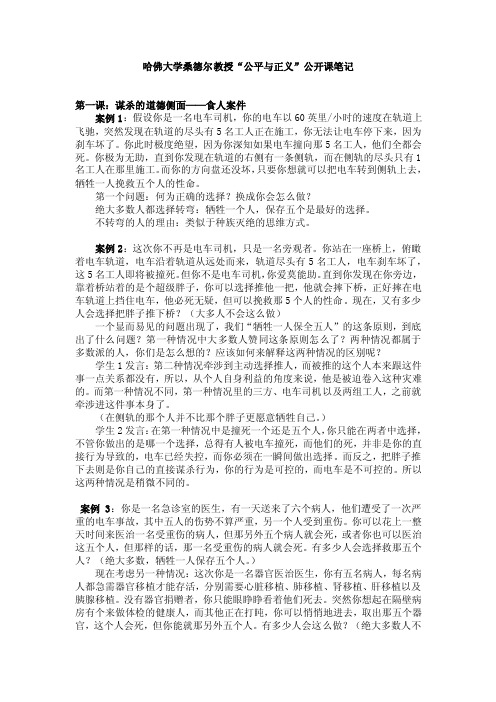
哈佛大学桑德尔教授“公平与正义”公开课笔记第一课:谋杀的道德侧面——食人案件案例1:假设你是一名电车司机,你的电车以60英里/小时的速度在轨道上飞驰,突然发现在轨道的尽头有5名工人正在施工,你无法让电车停下来,因为刹车坏了。
你此时极度绝望,因为你深知如果电车撞向那5名工人,他们全都会死。
你极为无助,直到你发现在轨道的右侧有一条侧轨,而在侧轨的尽头只有1名工人在那里施工。
而你的方向盘还没坏,只要你想就可以把电车转到侧轨上去,牺牲一人挽救五个人的性命。
第一个问题:何为正确的选择?换成你会怎么做?绝大多数人都选择转弯:牺牲一个人,保存五个是最好的选择。
不转弯的人的理由:类似于种族灭绝的思维方式。
案例2:这次你不再是电车司机,只是一名旁观者。
你站在一座桥上,俯瞰着电车轨道,电车沿着轨道从远处而来,轨道尽头有5名工人,电车刹车坏了,这5名工人即将被撞死。
但你不是电车司机,你爱莫能助。
直到你发现在你旁边,靠着桥站着的是个超级胖子,你可以选择推他一把,他就会摔下桥,正好摔在电车轨道上挡住电车,他必死无疑,但可以挽救那5个人的性命。
现在,又有多少人会选择把胖子推下桥?(大多人不会这么做)一个显而易见的问题出现了,我们“牺牲一人保全五人”的这条原则,到底出了什么问题?第一种情况中大多数人赞同这条原则怎么了?两种情况都属于多数派的人,你们是怎么想的?应该如何来解释这两种情况的区别呢?学生1发言:第二种情况牵涉到主动选择推人,而被推的这个人本来跟这件事一点关系都没有,所以,从个人自身利益的角度来说,他是被迫卷入这种灾难的。
而第一种情况不同,第一种情况里的三方、电车司机以及两组工人,之前就牵涉进这件事本身了。
(在侧轨的那个人并不比那个胖子更愿意牺牲自己。
)学生2发言:在第一种情况中是撞死一个还是五个人,你只能在两者中选择,不管你做出的是哪一个选择,总得有人被电车撞死,而他们的死,并非是你的直接行为导致的,电车已经失控,而你必须在一瞬间做出选择。
公正:该如何是好听课笔记中

第五节Hired.Guns.&.For.Sale.Motherhood1、民主制度的“同意”特征洛克认为只要政府是民主的,不是专制的,就可以强制人们服兵役去战场。
这里又是涉及到“同意”的问题,民主制度给人的感觉,就是有一个大部分人同意的程序,再根据这个程序由大部分人同意来选出管理者,管理者制定出大部分人都同意的政策来执行。
从本质来说,这样的制度设置,本身的目的并不是保证社会管理达到一个最优化,最幸福的结果。
而是从心理学角度制造的认同感----人只要认为某件事是自己“同意”过的,不论这件事是否被自己理解,都会导致更多的概率去维护它。
这种以“同意”为基础的制度其实无论在产生过程和执行的结果上,并不一定能够得到多数人的真正的认同。
因为这种同意并不是信息对等的情况下产生的,也就是说,很多人“同意”了这个程序或者管理者,但他或她其实不论对程序还是对领导者都不够了解。
并且,即便所有的人对这个民主程序都有足够的理解,但也很少有人能够保证这个程序运作出的结果会让人满意。
以民主最彻底的美国为例,美国在总统选举上的投票率也就刚好过半,而且还曾一度跌落到接近50%。
尽管有各种原因,但如此低的投票率还是体现了很多人对投票会产生什么样的结果没有办法预料,也就没有必要参与。
(美国的投票率远低于欧洲,主要是以下几点原因,一是选民登记手续需要自己办,比较繁琐。
二是美国人需要投票的事情太多,小到所在区郡县议员,大到国会的参众议员、总统,以及党派候选人、重大事件的公投等等,有些地区在四年一届的总统任期内需要投票过百次,也确实繁重。
但象英国的内阁民主制,民众投票次数不多,投票率也高,但这种民主一旦决定哪个党派当选,剩下的就都是政客集团内部协商,没有民众什么事。
也就更谈不到有多少“同意”基础。
)在洛克那个时代,是民族国家的发展期,英国做为民主制度的发源地,确实是摸索出了人们基于“同意”而认同所带来的好处,那就是有利于形成一个更紧密也更精密的共同体----现代国家。
哈佛大学公开课听课笔记公正
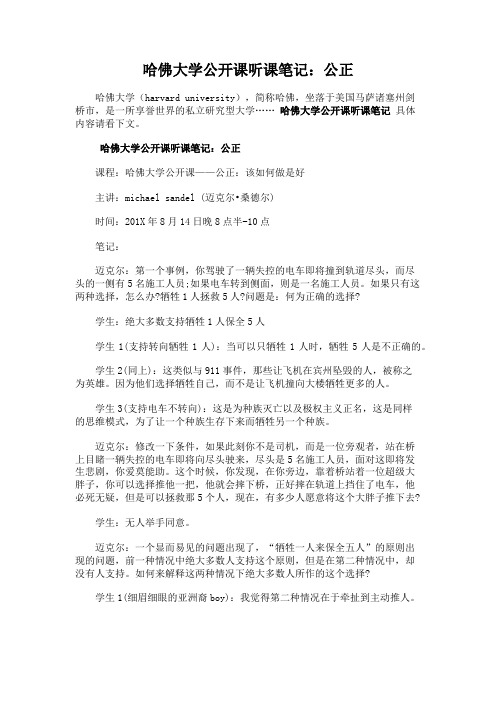
哈佛大学公开课听课笔记:公正哈佛大学(harvard university),简称哈佛,坐落于美国马萨诸塞州剑桥市,是一所享誉世界的私立研究型大学…… 哈佛大学公开课听课笔记具体内容请看下文。
哈佛大学公开课听课笔记:公正课程:哈佛大学公开课——公正:该如何做是好主讲:michael sandel (迈克尔•桑德尔)时间:201X年8月14日晚8点半-10点笔记:迈克尔:第一个事例,你驾驶了一辆失控的电车即将撞到轨道尽头,而尽头的一侧有5名施工人员;如果电车转到侧面,则是一名施工人员。
如果只有这两种选择,怎么办?牺牲1人拯救5人?问题是:何为正确的选择?学生:绝大多数支持牺牲1人保全5人学生1(支持转向牺牲1人):当可以只牺牲1人时,牺牲5人是不正确的。
学生2(同上):这类似与911事件,那些让飞机在宾州坠毁的人,被称之为英雄。
因为他们选择牺牲自己,而不是让飞机撞向大楼牺牲更多的人。
学生3(支持电车不转向):这是为种族灭亡以及极权主义正名,这是同样的思维模式,为了让一个种族生存下来而牺牲另一个种族。
迈克尔:修改一下条件,如果此刻你不是司机,而是一位旁观者,站在桥上目睹一辆失控的电车即将向尽头驶来,尽头是5名施工人员,面对这即将发生悲剧,你爱莫能助。
这个时候,你发现,在你旁边,靠着桥站着一位超级大胖子,你可以选择推他一把,他就会摔下桥,正好摔在轨道上挡住了电车,他必死无疑,但是可以拯救那5个人,现在,有多少人愿意将这个大胖子推下去?学生:无人举手同意。
迈克尔:一个显而易见的问题出现了,“牺牲一人来保全五人”的原则出现的问题,前一种情况中绝大多数人支持这个原则,但是在第二种情况中,却没有人支持。
如何来解释这两种情况下绝大多数人所作的这个选择?学生1(细眉细眼的亚洲裔boy):我觉得第二种情况在于牵扯到主动推人。
哈佛公开课《公正:该如何是好?》笔记 (桑德尔教授)

A电车刹车失控,轨道上5个人,另一个废弃到1轨道上有1个人,方向盘没有失灵,如何选择?你是一个站在天桥上的旁观者,电车刹车失控,轨道上5个人,你旁边有一个胖子,把胖子推下去(你有一个方向盘控制一个陷阱,让胖子掉在轨道上)就可阻挡电车前进拯救5个人,如何选择?你是一名外科医生,有5个人因为电车事故受了伤需要器官移植,一个需要心脏、一个需要肝脏、一个需要肺、一个需要肾脏,旁边房间有一个健康的正在睡觉的人,你是否会牺牲一个拯救5个?1、结果主义的道德推理取决于道德行为的后果。
边沁功利主义哲学:为最多人谋求最大的利益16世纪一艘游艇在南大西洋遇到了海难,4名船员,其中一名侍者是个孤儿没有家庭没有亲人,船后来坠毁,他们逃到救生艇,只有少量食物。
后来食物吃完,侍者喝了海水病倒了。
船长决定抽签决定谁来死拯救其他人,但有人不同意,最后没有执行抽签,而是杀了侍者。
最后仨人被一艘德国船救起。
辩论:“把其他人的生命掌握在自己手中,我们没有那个权力。
”“如果·征得侍者的同意将其杀死(或者侍者自己提出杀死自己拯救大家)”假如抽签后正好决定侍者的死,是否觉得这是一种谋杀?2、绝对主义得到的推理认为,道德有其绝对的道德原则,有明确的职责,明确的权利,不论后果是怎样。
3、为什么一个同意的行为,产生这些道德上的区别?B功利主义1、吸烟有害健康,吸烟早死可以减少政府在住房、医疗、养老上面的支出,同时烟草公司每年会给政府缴纳很高的税收。
2、福特公司出品一款小型汽车,1汽车销售很好,但油箱设在汽车背部,会与后方碰撞,油箱爆炸,炸死一些人后,将其告上法庭,福特知道这个油箱问题,需要做一个特殊挡板,但出于成本(每个1100$,12.5million cars,共137million;如果同样制作出的安全汽车会减少180deaths,每人赔偿200,000$,和180injuries每人赔偿67,000$,和2000vehicles维修每辆700$,收益只有49.5million)考虑未将其实施。
哈佛大学公开课《公正:怎么做才正确》1-18
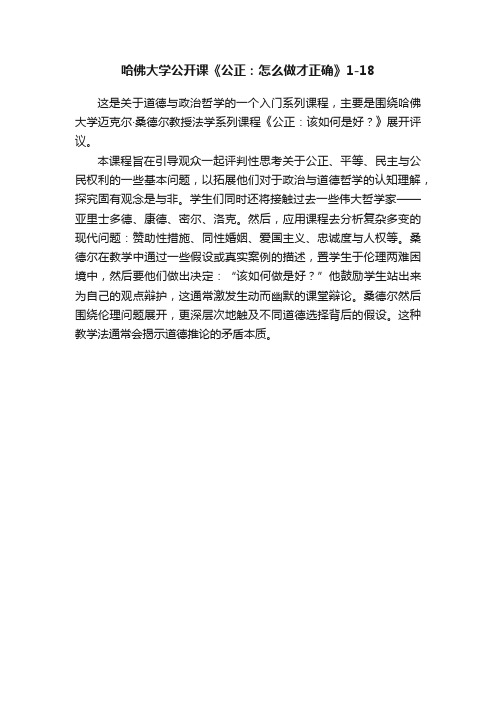
哈佛大学公开课《公正:怎么做才正确》1-18这是关于道德与政治哲学的一个入门系列课程,主要是围绕哈佛大学迈克尔·桑德尔教授法学系列课程《公正:该如何是好?》展开评议。
本课程旨在引导观众一起评判性思考关于公正、平等、民主与公民权利的一些基本问题,以拓展他们对于政治与道德哲学的认知理解,探究固有观念是与非。
学生们同时还将接触过去一些伟大哲学家——亚里士多德、康德、密尔、洛克。
然后,应用课程去分析复杂多变的现代问题:赞助性措施、同性婚姻、爱国主义、忠诚度与人权等。
桑德尔在教学中通过一些假设或真实案例的描述,置学生于伦理两难困境中,然后要他们做出决定:“该如何做是好?”他鼓励学生站出来为自己的观点辩护,这通常激发生动而幽默的课堂辩论。
桑德尔然后围绕伦理问题展开,更深层次地触及不同道德选择背后的假设。
这种教学法通常会揭示道德推论的矛盾本质。
第1讲:《杀人的道德侧面》、第2讲:《食人惨案》如果必须选择杀死1人或者杀死5人,你会怎么选?正确的做法是什么?教授Michael Sandel在他的讲座里提出这个假设的情景,有多数的学生投票来赞成杀死1人,来保全其余五个人的性命。
但是Sandel提出了三宗类似的道德难题-每一个都设计巧妙,以至于抉择的难度增加。
当学生站起来为自己的艰难抉择辩护时,Sandel提出了他的观点。
我们的道德推理背后的假设往往是矛盾的,而什么是正确什么是错的问题,并不总是黑白分明的。
Sandel介绍了功利主义哲学家Jeremy Bentham(杰瑞米·边沁)与19世纪的一个著名案例,此案涉及到的人是4个失事轮船的船员。
他们在海上迷失了19天之后,船长决定杀死机舱男孩,他是4个人中最弱小的,这样他们就可以靠他的血液和躯体维持生命。
案件引发了学生们对提倡幸福最大化的功利论的辩论,功利论的口号是“绝大多数人的最大利益”。
第3讲:《给生命一个价格标签》、第4讲:《如何衡量快乐》Jeremy Bentham(杰瑞米·边沁)在18世纪后期提出的的功利主义理论-最大幸福理论-今天常被称为“成本效益分析”。
- 1、下载文档前请自行甄别文档内容的完整性,平台不提供额外的编辑、内容补充、找答案等附加服务。
- 2、"仅部分预览"的文档,不可在线预览部分如存在完整性等问题,可反馈申请退款(可完整预览的文档不适用该条件!)。
- 3、如文档侵犯您的权益,请联系客服反馈,我们会尽快为您处理(人工客服工作时间:9:00-18:30)。
网易公开课《公正》课堂笔记1. 《杀人的道德侧面》如果必须选择杀死1人或者杀死5人,有多数的学生投票来赞成杀死1人,来保全其余五个人的性命。
如果在最后,可以有五个人活下来。
那么哪怕牺牲一个人的生命也是值得的。
这个例子体现了结果主义的道德推理.事情的正确以及道德与否,取决于你的行为所产生的后果.结果主义的道德准则中最著名的例子是功利主义功利主义不考虑一个人行为的动机与手段,仅考虑一个行为的结果对最大快乐值的影响。
能增加最大快乐值的即是善;反之即为恶。
即使是为了救回5条人命。
杀害一个无辜者.人们在考虑是不是要这么做的时候,会考虑到这个行为的本身,无论结果如何人们觉得这是错的,而且大错特错。
这就引出了第二种道德推理,绝对主义的道德推理。
绝对主义的道德推理认为:道德有其绝对的道德原则,有明确的责任和权利,而无论所造成的结果是怎么样的.2.《同类相残案》人们是否也有某些基本权利?如果不是来自较大群体的福祉,或者效用或幸福?那么这些权利从何而生?为什么同意以一定的程序,公平的程序,就可以用该程序的运作来为最终带来的结果辩护?得到同意的基本思想:得到同意产生的道德影响是什么?为什么一个得到许可的行为会产生道德上是否允许的不同,使未经许可杀死一个生命是错误的,而本人同意了,在道德上就是允许的?3.《给生命一个价格标签》边沁版本的功利主义其主要思想就是:道德的最高原则,无论个人或政治道德,就是将公共福利,或集体的幸福最大化,或在快乐与痛苦的平衡中倾向快乐;简而言之就是,功利最大化.从这个理论的整体出发,从做正确的事的观点出发,政策和法律的公正的基础就是将效用最大化两个反对功利主义的不同意见:一是功利主义是否充分尊重了个体权利或少数群体的权利;另一个则是聚集起来的所有效益或价值,是否能将聚集起来的所有价值转换成金钱?Thorndike从他的研究中得到的结论.任何愿望或满足感都存在一个量来度量它们,因此是可度量的.狗或猫或鸡的生活都是由欲望组成,渴望,欲望,以及他们的满足.人类的生活,也是如此,虽然人类的欲望和欲求更加复杂.4.《如何衡量快乐》功利主义哲学家密尔认为,所有人类的体验都可以量化,但某些快乐是更值得拥有,更有价值的。
穆勒认为,如果社会重视更大程度的欢乐和公正,那么长远来说,社会整体终会有所进步。
他说,"我质疑一切不基于效用之上的公义评判标准"但是同时, 他认为基于效用的公义评判标准"是所有道德标准中主要, 神圣且独一无二的一部分."所以公义和个人权利在社会中的较高地位,并非因为它们脱离了功利主义的前提。
公义, 作为某些道德要求的合称,其在社会范围中所能起到的正面效用被人们普遍认同。
因此, 它比起其他的道德而言更为重要所以说, 公义是神圣的,是重要的, 对个人来说也是这样。
它不是那种可以被简单置换的东西。
但最终功利主义的原因是, 穆勒认为人类作为进取的物种,考虑长期利益的时候如果能够做到公义, 以及对权利的尊重,整个社会长期而言将会更加美好。
5.《自由选择》自由主义,它十分严肃的看待个人权利的问题。
之所以叫自由主义, 是因为它认为一个人的基本权利就是享受自由的权利,因为我们是独立的个体生命,我们不一定要被社会予取予求。
因为我们是独立的个体生命,我们有对自由的基本权利。
也就是说,我们可以自由的选择自己想过的生活,只要在享有自由的同时也尊重他人自由的权利。
自由主义者认为政府干预最少的社会是最理想的社会形态。
按照自由主义的观点来看, 大部分现代政府都做了三件不合法或是不公平的事情,其中之一是家长式的立法,即制订了让人们自己保护自己的法律。
第二点, 不该有道德上的立法。
很多法律试图起到提升公民素质或阐明社会道德价值的作用,自由主义者认为这也是一种对自由权利侵犯。
第三种被自由主义哲学家踢出局的法律政策就是税收或者任何为了再分配贫富之间收入财产的政策。
对于诺齐克和自由主义者来说,为再分配而实施的税收就是盗窃。
而且,这并不只是在道义上等同于索取一个人的部分生命和劳动的盗窃,在道义上,它等同于强制劳动。
诺齐克指出,强制劳动,就是奴隶制。
因为,如果我不拥有对自己劳动的全部所有权,那么,就可以毫无疑问的说,政府或是政治家群体拥有我本人的部分所有权。
国家拥有我的部分所有权。
由此可以推出我是一个奴隶,我不是自己的主人。
上述推理会为我们引出一个支撑自由主义观点的基本原则——我是自己的主人。
确切的说,就是自主的思想。
如果你不愿只是将人民当作偏心的集合,你就会意识到最基本的道德观点在于,我们自己的拥有者或所有人就是我们自己,这也是功利主义的错误所在。
6.《我属于谁?》为了普遍的福利而强迫某人,而利用某人这是错误的,因为它违背了我们是自己主人的这个基本事实,也就是违背了自我拥有或自我所有的基本道义事实。
自由主义反对再分配的论据正是以“我们是自己的主人”这个基本思想为起点。
自由主义者与那些为了集体的愉悦而利用人民的人斗争,是一种手段,就像在路边放一块停车牌,让利用别人的功利主义逻辑能直接察觉到一个强大的思想,即我们是我们自己的所有者。
7.《这片土地是我的土地》Locke指出,在“自然状态”,在任何政治体制建立之前,每个人都享有生命,自由和财产的自然权利。
然而,一旦我们同意进入社会,就同意了受法律制度的约束。
因此,Locke 认为,即使政府干预了个人的权力,这也是大多数人的意见赋予了它权力这么做的。
我们进入社会是通过同意,通过协议来离开自然状态,并被大多数人通过法律体系,人类的法律所管辖。
但这些人类法律合法的唯一前提是,他们尊重我们的自然权利,他们尊重我们不可剥夺的权利:生命、自由和财产,没有哪个议会或者立法机构或民主的全权证书可以合理地侵犯我们的自然权利。
没有法律可以侵犯我们的生命权、自由权和财产权。
但是,怎样才算尊重我的生命权和财产权,却是由各国政府决定和界定的。
8.《满合法年龄的成年人》我们正在通过社会生活对税收法律做“默认同意”,因此,税收是合法的。
而且,只要政府不是特意对某一群体征税-如果不是武断专横的-那么税收并没有侵犯个人的基本权利。
脱离自然状态的唯一途径就是采取一个“同意”的行动:同意放弃执法的权利,并且建立一个政府或者一个团体,在这里,有立法机关制定法律,并且每个人都事先同意,每个进来的人,也都事先同意服从多数人的决定。
权利是不可分割的,并且因此,我根本没有真正地拥有自己。
我不能处置我的生命、我的自由、我的财产,这样其实是侵犯了我的权利。
一旦有一个合法政府,经过同意而建立的合法政府,对洛克来说,唯一的限制,就是限制对人的生命、自由和财产的任意掠夺。
9.《雇枪》用洛克的观点看,一个民主的民选政府有权向人民征税,政府征税应经过人民的同意,因为这的确涉及到公共利益,而拿走个人的财产,但它不需要在税法制定或征集时去征求每个独立个体的意见。
它确实需要的是人在进入社会时,就事先默认赋予的同意权,并承担政治义务。
而一旦你承担了这些义务,你就同意了大多数人的约束。
生命权又怎样?个人拥有自己的观念难道不是受到侵犯吗?将军可以判处临阵逃脱或不服从命令—甚至是自杀性命令,但这些长官们不能做的事情是:他们没权拿走该士兵的一分一文,因为这种做法是不合法的,因为这是专制,腐败。
同意论在洛克的思想中非常重要,该同意不是个体对税收或军事命令的同意,而是在第一阶段加入政府,并受大多数人的约束时就默认同意了,这就是同意论的关键所在。
而且这相当关键,即使是建立在我们有一些天赋的生存权,自由权以及财产权基础之上的有限政府,即便这个有限政府只在观念上受限,并受到普遍使用的法律的监管,政府要依法行政,政府不能专制,这就是洛克的理论。
10. 《出售母亲》Sandel教授把自由市场交易运用到当代颇具争议的新领域:生殖权利。
一种反对意见和“不知情的同意”有关,这次不是因为明显的或隐含的强迫,而是因为不完美或者有缺陷的信息,所以“不知情的”或者“有缺陷的”同意可能产生于缺乏相关的信息。
产生第一个疑问:我们要计算出自愿交换的市场在涉及讨价还价、平等的信息时有多大的自由?第二种反对执行代孕合同的声音说这多少有点没有人性通过市场来交易生育,有些没有人性是什么意思?效用……用处是用来处理事物的唯一适当方法吗?包括生命、征兵、生育、养育?如果不是,我们如何计算?是否有些无法用钱买到的事物,并非因为“不知情的同意”而也可能是因为某些事物比单纯的使用具有更高的价值。
11.《考虑你的动机》康德:最具挑战性和最有难度的思想家之一。
康德认为,我们作为个体,是神圣的,是权力的享有者,但并不是因为我们拥有自己。
相反,理性和自由选择是我们的能力,使我们变得独特,使我们跟单纯的动物区别开。
当我们将责任付诸行动的时候,去做正确的事,只有这样,我们的行动才有道德的价值。
自由的行动,就意味着自主的行动。
自主的行动,就意味着遵从自己为自己设定的规则而行动,不是出于自然法则或因果定律。
尊重人类的尊严,意味着不仅仅将人视为实现目的的工具,而且要将人本身也视为终极目的。
由于这样的原因,为了一些人的幸福安乐而牺牲其他人,就是错误的。
我们之所以能作为自主的生命并给自己设定行为原则,是因为一种理性,这是一种我们作为人类而普遍拥有的理性,而非什么不同寻常的特质。
我们应该敬重别人的尊严,是因为我们都是理性的生命,我们都有理性思考的能力,正是我们无差别拥有的理性思维的能力,将尊严赋予我们所有人。
12.《道德的最高准则》康德说,就我们行为的道德价值而言,赋予它道德价值的是我们超越自身利益和偏好,将责任付诸行动的能力。
康德认为只有一种动机才称得上是道德的,那就是出于义务的动机,为了正确的理由做正确的事情。
只有当我是在独立自主的拿主意的时候,我才是自由的。
康德说理性的指导方式有两种:康德将这种理性的指导称为“律令”。
简单的说,律令就是指出你应该做某件事。
第一种律令,也许是我们最熟悉的,是假言律令。
假言律令使用的是工具理性,如果你想得到甲,那么你必须先做乙。
这是一种目的-手段的逻辑推理。
如果这行动本身就有价值,一个讲究理性的头脑也会认为这是必须做的事情,那么这种动机是就是绝对律令(已所不欲,勿施于人;人就是目的;尊重)。
13. 《谎言的教训》康德看来,人并不是因为顺从于法律而获得尊严,而是因为尊重那些法律,我是法律的作者,我附属于法律,同时我主动承担起法律,我遵循法律。
如果我们依照我们的道德心,自由的选择,那么我们就能保证道德法则成为一个人人共有的道德法则。
理性控制了意愿,理性主导者我的意愿,当我遵守道德法则的时候,是同样的理性让你为自己选择了道德法则,这就是为什么我们能自主为自己作出选择,我们每一个人都能为自己作出选择。
我们是有自主能力的个人,我们最后都遵循同一个道德法则——绝对律令从康德的观点看来一个谎言和一个误导的真相的差别有一个世界那么大,误导性的事实对道德律仍然有所尊重。
